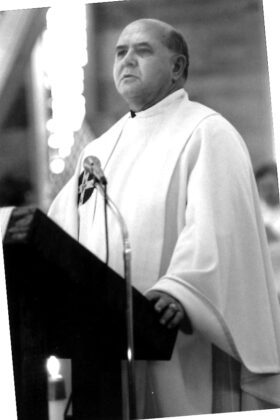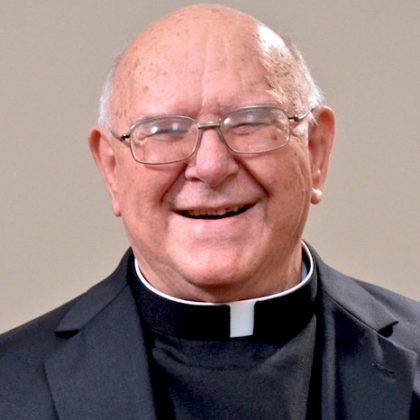
Fr. Frank Burshnick, SCJ, died on February 21. He was 82, professed for 53 years and ordained 49. Originally from Forest City, PA, he initially taught for five years at Immaculate Heart of Mary Seminary before entering parish ministry. In Texas, he served at Our Lady of Guadalupe in Brownsville, OLG in Raymondville, St. Cecilia in San Antonio, and Prince of Peace in Lyford.
During his years in the Rio Grande Valley he often assisted at a refugee center established by the bishop of Brownsville.
In 1984 he moved to Mississippi, where he ministered at the parishes of Sacred Heart in Walls and Christ the King in Southaven. In 2007 Fr. Frank retired and joined the Sacred Heart Community in Pinellas Park, FL, where he died. He is survived by his sister Margaret and brothers Gerald and Robert.
Services will be on Tuesday, February 25, in Pinellas Park, and on Friday, February 28 at Sacred Heart at Monastery Lake. Reception of the body and a wake service will begin at 9:30 a.m. at SHML. The Mass will be at 10:30 with interment following.
Fr. Frank’s story
In 2015, the North American Migration Committee published a book titled the North American Dehonian Story of Migration. In it, Dehonians and others shared their personal stories of immigration. The following was Fr. Frank’s contribution. It was written with the assistance of committee members.
Born to Slovenian parents…

Fr. Frank Burshnick was born in 1937 to Slovenian parents in a small mining town in Pennsylvania. He relates his experience growing up in a family of seven children as a second generation American. Living in a town that had six different ethnic Catholic churches, Fr. Frank experienced what immigration and the life of immigrants was all about. He lived among people who were Lithuanian, Polish, Irish, Italian, Slovak, Slovenian, and also members of the Eastern Russian Church. The population of about five thousand people in the community Fr. Frank grew up in was thus a mixture of many languages and cultures. The people who migrated to this town came to work in the coal mines, so there was a big wave of migration coming from the Easter Europe.
All these people came to America in order to find a better life and to escape from war and other deadly political issues. All these immigrant groups had to learn the dominant language of a new culture, in this case English. They had to deal with the fact that none of them was part of the dominant culture and thus they had to adapt to it and work themselves up from the lower to the higher levels of that culture.
Fr. Frank, however, was not an immigrant because he was a second generation Slovenian American born to immigrant parents in the United States. However, he appreciates the gift of his immigrant family because he recognizes that he also had to deal with a new culture and to work himself to achieve a better life in a melting pot of many people from many places and not just people born in the United States. And many people he knew, like him, were second or third generation immigrants in America. His experience as part of an immigrant family was still very strong when he entered religious life and again met people from all over the United States who had different backgrounds and had also had to adapt to a new dominant culture and language in this country.
Working in Texas right along the Mexican border, Fr. Frank had his first close experience with Hispanic immigrants especially coming from Mexico mostly illegally especially coming from Mexico. And the Bishop of Brownsville at that time had stablished a compound for the newcomers so they had a place to stay until they were ready to continue with their journey. Providing this help his was a big job. Fr. Frank worked together with many other people from Brownsville and Raymondville to help feed the new immigrants, give them shelter, and provide directions where to go to new immigrants who came to their door seeking help.
After working for over 17 years in the valley, Fr. Frank moved to Mississippi where he once again found himself close to the issue of immigration. However, this time he was not dealing with Hispanic people or people coming from Mexico. Instead, he dealt with people who had migrated from Africa and who, though they had been in the United States for many years, did not have the same rights as white people had at that time. In this way the dominant culture was the Anglo culture and the African American people where subjugated to many atrocities until the human rights movement took place.
In experiences like these, Fr. Frank found that the richness of his own background helped him to understand all these people who migrated to the United States. He knew they had been searching for a better life for themselves and their families and in many cases they also needed to escape persecution and dangerous political situations in their homelands.
Today Fr. Frank cannot understand how the government is doing enough to help these people but instead at times is even separating these families. He claims that recommendation today for the Church and for all the Christians is to listen to the words of Pope Francis when he says that we are all brothers and sisters in Christ and that we must welcome strangers, welcome aliens, into our hearts and homes. And even though sometimes it can be problematic, we should open many more opportunities to these people so they can find good homes. Today many people have forgotten that this country was built thanks to the work of millions of immigrants who came to the United States. The recommendation of Fr. Frank is to stop looking out for our own selfish interests and instead to care more for our brothers and sisters that need us today and to welcome them into our lives.

